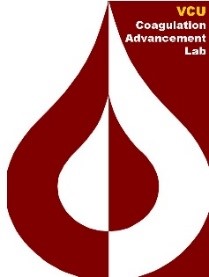Martin Research Lab
Research Lab of Erika J. Martin
Personal Statement
My research focus centers on disorders related to thrombosis and hemostasis, with a particular emphasis on special populations. These include individuals grappling with trauma-induced coagulopathy and those affected by rare blood disorders. Over my extensive 25+ year career, I have dedicated myself to tackling coagulation challenges in these uncommon conditions, with a primary spotlight on hemophilia. My contributions extend to the development of cutting-edge coagulation technologies and rigorous testing of novel therapeutics aimed at enhancing hemostatic function.
My expertise lies in hemostasis and platelet function measurements. Our lab has a robust track record, having published over 70 research articles in this field. We possess the necessary resources to assess platelet function (including aggregation, secretion, and contractility), perform thromboelastography, investigate thrombin generation, and analyze coagulation proteins using diverse assays (clotting, chromogenic, and immunologic).
In addition, I have fostered successful collaborations with multiple investigators across critical care, emergency medicine, the pharmaceutical industry, and basic science. My role in time-sensitive blood-based studies has encompassed coordinating research efforts—from protocol design and IRB submissions to sample collection, assay development, and researcher training.
Research Goals
- Cutting-Edge Research: I am committed to pioneering research in coagulation. My investigations span primary hemostasis, platelet function, and the impact of antithrombotic and hemostatic agents.
- Collaboration: I actively seek partnerships with fellow researchers. By joining forces, I aim to deepen our understanding of coagulation processes.
- Training Future Professionals: My lab plays a pivotal role in training healthcare practitioners. Through hands-on experience, we prepare the next generation for coagulation research.
- Advancing Patient Care: My ultimate mission is to enhance patient outcomes by advancing knowledge in the field of coagulation and thrombosis.
Research Focus
My specific research focus areas include 1) Developing new technologies to assess bleeding and clotting disorders; 2) Hemophilia; and 3) Trauma Induced Coagulopathy. The publications listed represent a sampling of these collaborations.
- Advancing Coagulation Assessment Technologies- Early in my career, I delved into the development of novel technologies for assessing bleeding and clotting disorders. Since the late 1990s, my research group has explored various methods to measure thrombin generation and hemostatic function using plasma and whole blood samples. These assays offer improved insights into global hemostasis and show promise for detecting both hypo- and hyper-hemostatic states. Additionally, they serve as valuable tools for monitoring hemostatic and anticoagulant agents. Notably, we pioneered a groundbreaking technology—the measurement of platelet contractile force. By studying the force generated by platelets when attached to fibrin in the presence of thrombin, we’ve opened new avenues for clinical assessment. Our discovery led to a patent application with the US Patent and Trademark Office, highlighting the potential of platelet contractile force and whole blood clot elastic modulus as clinical markers.
- Carr ME Jr, Martin EJ. Evolving techniques for monitoring clotting in plasma and whole blood samples. Clin Lab. 2004; 50(9-10):539-49. Review. PMID: 15481629.
- Carr ME, Martin EJ, Kuhn JG, Spiess BD. Onset of force development as a marker of thrombin generation in whole blood: the thrombin generation time (TGT). J Thromb Haemost. 2003 Sep;1(9):1977-83. PMID: 12941040.
- Carr ME Jr, Martin EJ, Carr SL. Delayed, reduced or inhibited thrombin production reduces platelet contractile force and results in weaker clot formation. Blood Coagul Fibrinolysis. 2002 Apr; 13(3):193-7. doi: 10.1097/00001721-200204000-00004. PMID: 11943932.
- Krishnaswami A, Carr ME Jr, Jesse RL, Kontos MC, Minisi AJ, Ornato JP, Vetrovec GW, Martin EJ. Patients with coronary artery disease who present with chest pain have significantly elevated platelet contractile force and clot elastic modulus. Thromb Haemost. 2002 Nov;88(5):739-44. PMID: 12428087.
- Personalized Monitoring of Hemophilia Therapies- For many years, my primary focus has centered on utilizing global hemostasis assays, including thromboelastography and thrombin generation, to assess clotting capabilities in patients with hemophilia. Simultaneously, I’ve worked diligently to develop enhanced methods for monitoring novel therapies. Notably, there are currently no clinically available assays to predict the efficacy of factor bypassing agents—such as recombinant factor VIIa, tissue factor pathway inhibitor neutralizing antibodies, and humanized bi-specific antibodies targeting activated factor IX and factor X. Our lab plays a pivotal role in exploring innovative approaches to personalize therapy for these conditions.
- Das K, Pendurthi UR, Manco-Johnson M, Martin EJ, Brophy DF, Mohan Rao LV. Factor VIIa Treatment Increases Circulating Extracellular Vesicles in Hemophilia Patients: Implications for the Therapeutic Hemostatic Effect of FVIIa. J Thromb Haemost. 2022 Aug;20(8):1928-1933. doi: 10.1111/jth.15768. Epub 2022 Jun 6. PMID: 35608928.
- Martin EJ, Nolte ME, Kuhn J, Schmidt N, Pfaff N, Brophy DF. An in vitro pharmacodynamic spiking study of befovacimab, a tissue factor pathway inhibitor monoclonal antibody, in blood samples from patients with severe FVIII deficiency. Haemophilia. 2021 Jul;27(4):690-698. doi: 10.1111/hae.14314. Epub 2021 Apr 29. PMID: 33915599.
- Patel-Hett S, Martin EJ, Mohammed BM, Rakhe S, Sun P, Barrett JC, Nolte ME, Kuhn J, Pittman DD, Murphy JE, Brophy DF. Marstacimab, a tissue factor pathway inhibitor neutralizing antibody, improves coagulation parameters of ex vivo dosed haemophilic blood and plasmas. Haemophilia. 2019 Jul 23; doi: 10.1111/hae.13820. [Epub ahead of print] PMID: 31336410.
- Brophy DF, Martin EJ, Kuhn J. Use of global assays to monitor emicizumab prophylactic therapy in patients with haemophilia A with inhibitors. Haemophilia. 2019 Mar;25(2): e121-e123. doi: 10.1111/hae.13689. Epub 2019 Feb 12. PubMed PMID: 30748061.
- Unraveling Trauma-Induced Coagulopathy- Trauma-induced coagulopathy (TIC) is a prevalent and life-threatening clotting disorder following injury. Within TIC, platelet dysfunction plays a pivotal role, yet the underlying mechanisms remain elusive. Our laboratory is dedicated to characterizing the phenotype of platelet dysfunction in TIC through a comprehensive range of functional and mechanistic assays. Our approach spans from animal models to human studies, ensuring translational relevance. We maintain unwavering commitment to this therapeutic area, with ongoing projects supported by NIH and DoD funding.
- White NJ, Contaifer D, Martin EJ, Newton JC, Mohammed BM, Bostic JL, Brophy GM, Spiess BD, Pusateri AE, Ward KR, Brophy DF. Early hemostatic responses to trauma identified using hierarchal clustering analysis. J Thromb Haemost 2015; 13:978-88. PMID: 25816845
- White NJ, Newton JC, Martin EJ, Mohammed BM, Contaifer D, Bostic JL, Brophy GM, Spiess BD, Pusateri AE, Ward KR, Brophy DF. Clot formation is associated with fibrinogen and platelet forces in a cohort of severely injured emergency department trauma patients. Shock 2015; 44 Suppl 1: 39-44. PMID: 25643013
- White NJ, Martin EJ, Brophy DF, Ward KR. Examining platelet-fibrin interactions during traumatic shock in a swine model using platelet contractile force and clot elastic modulus. Blood Coagul Fibrinolysis. 2011 Jul; 22(5):379-87. PMID: 21537163
- White NJ, Martin EJ, Brophy DF, Ward KR. Coagulopathy and traumatic shock: characterizing hemostatic functions during the critical period prior to fluid resuscitation. Resuscitation 2010; 81:111-16. PMCID: PMC281507
VCU Coagulation Advancement Laboratory (VCAL)
Key Goals:
- Cutting-Edge Research: VCAL aims to conduct cutting-edge research in the field of coagulation. This includes investigating primary hemostasis, platelet function, and the effects of antithrombotic and hemostatic agents.
- Scientific Publications: VCAL strives to contribute to scientific knowledge by publishing peer-reviewed research papers. With over 70 publications to its credit, it actively disseminates findings to the scientific community.
- Collaboration: VCAL fosters collaboration with other researchers. It welcomes partnerships and joint efforts to advance our understanding of coagulation processes.
- Training Future Professionals: The lab plays a crucial role in training medical and pharmacy students, providing them with hands-on experience and exposure to coagulation research.
- Facility Enhancement: VCAL continuously enhances its state-of-the-art facility, ensuring that it remains well-equipped for various assays, measurements, and analyses related to coagulation.
- Advancing Patient Care: Ultimately, VCAL’s overarching goal is to contribute to improved patient care by advancing knowledge in the field of coagulation and thrombosis.
VCAL delves into the intricate mechanisms and therapeutic approaches related to inherited and acquired coagulation disorders. These disorders manifest in conditions such as hemophilia, kidney disease, cardiac surgery, trauma, and various inflammatory processes

Location: Located within the VCU School of Medicine Cottrell Surgical Innovation Suite, and it is part of the Office of Research, Biomedicine, Innovation and Technology- ORBIT
Establishment: VCAL has a rich history, having been established over 20 years ago. It stands as one of the most comprehensive academic coagulation research laboratories in the USA.
Research Contributions:
- VCAL has been responsible for over 70 peer-reviewed research publications.
- It focuses on primary hemostasis and platelet function studies.
- The lab evaluates new antithrombotic and hemostatic agents, antiplatelet therapy, and new medical devices and assays.
- VCAL actively designs experimental and clinical protocols.
- It maintains sample banks and prepares databases for data analysis.
Collaboration and Training:
- VCAL welcomes collaboration with researchers.
- The lab has a long history of providing training opportunities for medical and pharmacy students.
- Additionally, it offers research opportunities for fellows in Surgery, Cardiology, Emergency Medicine, and Hematology.
Facility Features:
- VCAL occupies a 1500 sq. foot facility.
- It is equipped with resources for measuring platelet function, including aggregation, secretion, and contractility.
- The lab conducts viscoelastic testing using multiple platforms.
- Thrombin generation studies are also part of its capabilities.
- Platelet flow cytometry, coagulation protein analysis (using clotting, chromogenic, and immunologic assays), and biomarkers assessment (inflammation, endocrine, and endothelial function) are integral to VCAL’s work.
|
Instruments include: |
||
|
|
|
|
|
|
|
|
|
|
|
|
|
|
|
VCU Coagulation Advancement Lab (VCAL)
The VCU Coagulation Advancement Lab (VCAL) is dedicated to supporting collaborative academic research as well as research with the biotech and pharmaceutical industries. VCAL is committed to establishing an interdisciplinary approach to the study of blood coagulation.
Our services include studies on primary hemostasis and platelet function, evaluation of new antithrombotic and hemostatic agents, antiplatelet therapies, and new medical devices and assays.
Assays at VCAL include:
- TEG- R, K, Angle, MA, G, CI, LY30, Platelet Mapping
- ROTEM- NATEM, INTEM, EXTEM, HEPTEM
- Whole Blood or Platelet Rich Plasma Aggregation & Secretion
- Thrombin Generation Assay in Platelet Rich and Platelet Poor Plasma
- Platelet Markers by Flow Cytometry (CD41, CD42b, CD62p, PAC-1)
- ELISA assays by Multiplex (cytokines, metabolic, cardiovascular panels)
- PT, PTT, Fibrinogen
- Clotting Factor assays (II, V, VII, VIII, IX, X, XI, XII Activity)
- Emicizumab level
- Protein C and Protein S Activity
- Antithrombin (AT) Activity and Antigen
- Anti-Xa Activity
- D-dimer (Quantitative)
- VWF Antigen
- CBC (with platelet count)
- Instruments at VCAL include:
- Haemoscope Thromboelastographic (TEG)
- IL Rotational Thromboelastogram (ROTEM)
- STAGO Calibrated Automated Thrombogram (Thrombin Generation Assay)
- Dade PFA100
- Chronolog Whole Blood Aggregometer
- Luminex 200 Multiplex Analyzer
- Horiba ABX-60 Hematology Analyzer
- Accuri C-6 Flow Cytomer
- Diagnostica Stago Compact STA Automated Coagulation Analyzer (mechanical and optical assays-clot detection, chromogenic and immunological)
Lab Members
Current:
Daniel Afosah, Ph.D. (K99/R00 Scholar, Medicinal Chemistry)
Former:
Elsamani Abdelfadiel, Ph.D. (Post-Doctoral Fellow, Medicinal Chemistry)
Olivia Dennehy (Undergraduate student, 4th year)
Casey Boyer (Pharm. D. student)
Bassem M. Mohammed (Ph.D. student, Pharmacy)
Kelly Lastrapes, M.D. (Hematology Fellow)
Jason C. Newton (Ph.D. student, Biochemistry)
Maitham Al-Hawaj (Ph.D. Student, Pharmacy),
Nathan White, M.D. (NIH K08 fellow)
Richa Dua (P1 student, Pharm.D./Ph.D. Summer Fellow)
Jessica Bostic (summer intern)
Daniel Contaifer (Lab Technician)
Clifton Braxton (Lab Technician)
Jingmei Song (Lab Technician)
Ashok Krishnaswami M.D. (Cardiology Fellow)
Publications
Contact
Erika J. Martin, MT (ASCP), Laboratory Director
E-mail: erika.martin@vcuhealh.org
